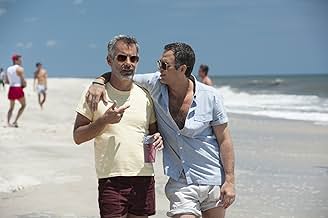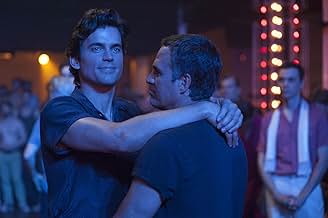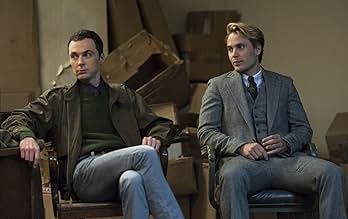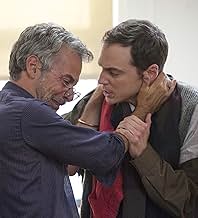In the early 1980s, the onset of the HIV-AIDS crisis in New York led to an emergence of homosexual activists. With support from the medical community, they try to raise awareness about the d... Read allIn the early 1980s, the onset of the HIV-AIDS crisis in New York led to an emergence of homosexual activists. With support from the medical community, they try to raise awareness about the disease.In the early 1980s, the onset of the HIV-AIDS crisis in New York led to an emergence of homosexual activists. With support from the medical community, they try to raise awareness about the disease.
- Won 2 Primetime Emmys
- 29 wins & 59 nominations total
Adam B. Shapiro
- Bella
- (as Adam Shapiro)
Lynwood Bradley
- Mario
- (as Will Bradley)
Featured reviews
Movie that details when AIDS hit in 1981...and the government did nothing to stop it (because it was killing just gay men). It has writer Ned Weeks (Mark Ruffalo) fighting a battle to get the news out and attacking the NYC government for doing nothing to stop it. He also falls in love with Felix Turner (Matt Bomer) a newspaper reporter. It follows him and his friends up to 1984 when the epidemic becomes too big to ignore.
I came out in 1981 and this movie captures EXACTLY what it was like. The anger, fear, hysteria and homophobia surrounding AIDS made life a living hell for gay men. This movie made me cry more than once because it bought back all the memories of friends dying...and no one seemed to care. Ruffalo is GREAT in the lead role. More than once he explodes and perfectly captures the anger and frustration gay men were feeling back then. Basically mostly the entire cast was great. Bomer was good as Felix, Julia Roberts was GREAT as a doctor who is handicapped and very frank and Taylor Kitsch was good as Bruce Niles. The only bad performance was by Jim Parsons. He tries a dramatic role and was terrible. Very wooden. Also the movie is a too long and the ending overly dramatic. Still this is essential viewing....especially for gay teens who have no idea what we went through. VERY depressing but it must be seen.
I came out in 1981 and this movie captures EXACTLY what it was like. The anger, fear, hysteria and homophobia surrounding AIDS made life a living hell for gay men. This movie made me cry more than once because it bought back all the memories of friends dying...and no one seemed to care. Ruffalo is GREAT in the lead role. More than once he explodes and perfectly captures the anger and frustration gay men were feeling back then. Basically mostly the entire cast was great. Bomer was good as Felix, Julia Roberts was GREAT as a doctor who is handicapped and very frank and Taylor Kitsch was good as Bruce Niles. The only bad performance was by Jim Parsons. He tries a dramatic role and was terrible. Very wooden. Also the movie is a too long and the ending overly dramatic. Still this is essential viewing....especially for gay teens who have no idea what we went through. VERY depressing but it must be seen.
This is such a well told story. Mark Ruffalo has always been an amazing actor, however here he really takes center stage.He has not had such an impacting role since his breakthrough performance in you can count on me. Julia Roberts and Matt Bomer are also excellent. It is great to see so many great actors coming together to tell such an important story. A scene towards the end of the movie between Mark Ruffalo and Matt Bomer has particularly stayed with me and really pulled at the heart strings. It is a story that needed to be told and the way the gay community were ignored during this period of time is a disgrace. This is a better movie that the much lauded Dallas Buyers Club and needs to find a wide audience.
I saw the film Saturday night, it's still in my head and as I sit here writing this review. I feel a great sense of sadness for all those lost over all of these years, but what is most on my mind is Mark Ruffalo's tour De force performance as Ned Weeks.
Although a fictionalized character based on Larry Kramer, Mark made this part his own, while still keeping the aspects of Kramer's real persona. You could feel his performance, every mood of it (and believe me it runs through all of them). Mark's ability to transform into a gay man (at a time in gay history that was so scary and unimaginable) with such believability was amazing. I forgot I was watching Mark Ruffalo, his performance completely erased his own being.
There are many aspects of the film that critics are tearing into. Critics who were not even alive at the time opinion's on the subject are worthless in my view, but for those critics who have long ago left their pacifiers at home I can agree with some of the negatives.
The film showed only a segment of the gay population living in NYC at that time, primarily the rich A listers who were never political before AIDS and only became so when their own lives were in danger. The majority of gay men did not spend sex filled weekends on Fire island in expensive beach houses. They were working men of all races and incomes who because of their financial circumstances, lack of insurance etc died quickly and with little notice outside their friends and family, if they were lucky enough to have a family that accepted them (remember this was 1981 not 2014).
This film brought back a lot of sadness and regrets for me, I wanted to hug Ned Weeks and tell him that things do get better in the future. It's not often that a performance affects me, but Ruffalo's did, not because he was playing a fictionalized version of a real person, but because he was playing a little bit of a lot of different men, who at the time thought the promised land had finally arrived for gay men and only to see it turn into a Holocast right before their eyes.
I hope that Mark is nominated and wins an Emmy for his performance, because he deserves it.
Although a fictionalized character based on Larry Kramer, Mark made this part his own, while still keeping the aspects of Kramer's real persona. You could feel his performance, every mood of it (and believe me it runs through all of them). Mark's ability to transform into a gay man (at a time in gay history that was so scary and unimaginable) with such believability was amazing. I forgot I was watching Mark Ruffalo, his performance completely erased his own being.
There are many aspects of the film that critics are tearing into. Critics who were not even alive at the time opinion's on the subject are worthless in my view, but for those critics who have long ago left their pacifiers at home I can agree with some of the negatives.
The film showed only a segment of the gay population living in NYC at that time, primarily the rich A listers who were never political before AIDS and only became so when their own lives were in danger. The majority of gay men did not spend sex filled weekends on Fire island in expensive beach houses. They were working men of all races and incomes who because of their financial circumstances, lack of insurance etc died quickly and with little notice outside their friends and family, if they were lucky enough to have a family that accepted them (remember this was 1981 not 2014).
This film brought back a lot of sadness and regrets for me, I wanted to hug Ned Weeks and tell him that things do get better in the future. It's not often that a performance affects me, but Ruffalo's did, not because he was playing a fictionalized version of a real person, but because he was playing a little bit of a lot of different men, who at the time thought the promised land had finally arrived for gay men and only to see it turn into a Holocast right before their eyes.
I hope that Mark is nominated and wins an Emmy for his performance, because he deserves it.
Heart-rending, gut-wrenching adaptation by Larry Kramer of his own successful play about the foundation and formation in 1982 of the Gay Men's Health Crisis in New York City in the wake of what was then-called the Gay Cancer (now HIV/AIDS). Dramatization of events, with Mark Ruffalo's screenwriter Ned Weeks substituting for Kramer, is necessarily a no-holds-barred examination of gay sex in the '80s and its consequences, with the gay community themselves their own worst enemy (by being asked to abstain in the wake of more information on the disease, they felt oppressed as a modern culture and rebelled). In spite of an agonizingly long gestation period for this material (which Barbra Streisand optioned years ago, but was unable to finance), director Ryan Murphy has crafted an immediate and powerful document, alternately angry, sexy, tough, moving and thoughtful. Though "Longtime Companion" and the cable-film "And The Band Played On" have covered the AIDS epidemic (and done it extremely well), that does not lessen the impact of this HBO film, which packs an emotional wallop. Performances from Ruffalo, Julia Roberts, Alfred Molina, Matt Bomer, Jim Parsons and the entire cast are superlative.
I never cry when watching movies or reading books but this one really got to me. I believe it was an important story that needed to be told. The movie was brought alive by amazing actors (especially Matt Bomer<3) I really do hope that this movie is taken seriously and gets more attention due to the fact that more people need to know about AIDs awareness and because discrimination and segregation still happens within the gay community which I find absolutely disgusting. If we really did believe in equal rights and all that BS we wouldn't be shunning gay people. And for those of you who are saying only gay people can enjoy this movie that is so stupid. I'm 100% straight and loved this definitely I my top 10 fav movies:) I definitely recommend watching this movie!
Did you know
- TriviaJim Parsons, who plays Tommy, also played the part in the 2011 Broadway revival, making him the only actor to reprise his role. His co-stars included Ellen Barkin, Lee Pace, John Benjamin Hickey, and Luke Macfarlane.
- GoofsWhen Felix is riding the subway while observing a rider with lesions, the subway car is immaculately clean and graffiti free. During the early-1980s (the time this film takes place), New York City subway cars were notoriously gritty looking with graffiti covering the inside and outside of the cars. Police officers were also a common sight as crime on the subway was at an all time high. During the late 1980s, the Metropolitan Transportation Authority (MTA) which oversaw the city's subway services purchased a newer model from Canadian manufacturer Bombardier that was made of graffiti-proof alloys and had a different seat layout from previous trains. This model is the one used in this film.
- Quotes
Felix Turner: Men do not naturally not love. They learn not to.
- SoundtracksAngel Eyes
Written by Andy Mackay, Bryan Ferry
Performed by Roxy Music
Courtesy of Virgin Records Ltd.
Under license from Universal Music Enterprises
Details
- Runtime
- 2h 12m(132 min)
- Color
- Sound mix
- Aspect ratio
- 1.78 : 1
Contribute to this page
Suggest an edit or add missing content
























